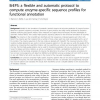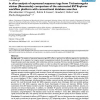2455 search results - page 36 / 491 » Computability of Models for Sequence Assembly |
ISMB
1997
1997
Inferring Gene Structures in Genomic Sequences Using Pattern Recognition and Expressed Sequence Tags
13 years 10 months ago
Abstract.) Ying Xu, Richard J. MuraF, and Edward C. Uberbacher Computer Science and Mathematics Division and tLife Sciences Division Computational methods for gene identification ...
PERCOM
2009
ACM
14 years 3 months ago
2009
ACM
—We present a middleware platform for assembling pervasive applications that demand fault-tolerance and adaptivity in distributed, dynamic environments. Unlike typical adaptive m...
BMCBI
2010
13 years 6 months ago
2010
Background: Models for the simulation of metabolic networks require the accurate prediction of enzyme function. Based on a genomic sequence, enzymatic functions of gene products a...
BMCBI
2008
13 years 8 months ago
2008
Background: The analysis of expressed sequence tags (EST) offers a rapid and cost effective approach to elucidate the transcriptome of an organism, but requires several computatio...
SASO
2007
IEEE
14 years 2 months ago
2007
IEEE
This paper describes, and evaluates benefits of, a design methodology to translate certain mathematical models into the design of novel, self-adaptive, peer-to-peer (p2p) distrib...


